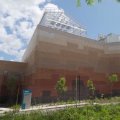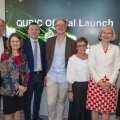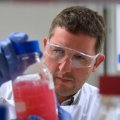UQ scientists have been awarded four of the six 2012 Queensland Young Tall Poppy Science Awards to benefit the community, announced tonight.
They are studying areas as diverse as evidence-based occupational therapy practice, conservation of our coastal resources, materials chemistry and nanotechnology for more precise medical treatment, and biomedical science to treat diseases such as Alzheimer’s.
Queensland Chief Scientist Dr Geoff Garrett AO, on behalf of the Queensland Government, and UQ Vice-Chancellor Professor Peter Høj, representing sponsors, made the announcement.
Congratulating all 2012 Queensland Tall Poppies, Professor Høj said: “I have seen so many great Tall Poppies, and it always gives me a spring in the step to witness the next wave of talent, with huge aspirations, coming through.”
The Tall Poppy Campaign was created in 1998 by the Australian Institute of Policy and Science.
The Young Tall Poppy Science Awards and the Queensland-Smithsonian Fellowships were announced at the 2012 Science and Innovation reception, part of the bipartisan Science in Parliament program.
The UQ winners are:
• Dr Tammy Hoffmann of UQ’s School of Health and Rehabilitation Sciences, and the Centre for Research in Evidence-Based Practice at Bond University, who is studying evidence-based practice, patient education, occupational therapy.
Dr Hoffmann is researching facilitators to, and barriers of evidence-based practice from both the health professionals’ and patients’ perspective.
The research is guiding the development of solutions that can help to ensure that research evidence is used by clinicians and patients when making health decisions.
“Some solutions aim to increase clinicians’ awareness of evidence, whilst others make the evidence more useable or help clinicians to clearly communicate the evidence and decisions needed to patients,” Dr Hoffmann said.
“Explaining intervention options and the evidence for each option to patients in an understandable way is key to empowering patients to take an active role in their health care, but is often not done or not done well.”often not done or not done well,” Dr Hoffmann said.
• Dr Morena Mills of UQ’s Global Change Institute, who studies applied conservation problems.
Dr Mills’ research involves identifying spatial solutions for natural resource management problems, through a process called systematic conservation planning.
“Effective systematic conservation planning involves stakeholder engagement with various groups from government agencies to villagers, and the use of available science to inform resource management decisions,” Dr Mills said.
Her research provides strategies on where, when and how to manage coastal ecosystems in order to maximise social and environmental benefits now and for future generations.
• Dr Kristofer Thurecht of UQ’s Australian Institute for Bioengineering and Nanotechnology, and the Centre for Advanced Imaging, is studying materials chemistry and nanotechnology.
Dr Thurecht is developing “smart” biomedical imaging devices that can diagnose, treat and monitor a therapy using nanomedicine.
“These devices are designed with an internal molecular "switch", that gives information about where a particular drug is delivered, or treatment is applied, to specific regions within the body,” Dr Thurecht said.
“The goal is to combine medical imaging with drug delivery, providing information on where a therapeutic agent is being delivered, when it is being delivered and how much is being delivered to a particular site in the body.
“The overarching aim of this research is to develop unique treatment regimes that can be tailored for individual patients that have a particular disease.”
• Dr Trent Woodruff of the UQ School of Biomedical Sciences is studying biomedical Science.
Dr Woodruff’s research focuses on identifying the causes behind the ageing of the brain in health and disease.
“Brain cell loss is a normal phenomenon which occurs as we age, but also is the process behind several debilitating, and unfortunately common diseases such as Alzheimer's disease, Parkinson's disease and Huntington's disease,” he said.
Research from his laboratory suggests that immune inflammation may be a key component which precipitates or accelerates this disease process.
The group has also helped to develop a drug which inhibits this inflammatory substance which has the potential to limit brain cell loss in humans, and thus treat diseases such as Alzheimer's, and also potentially slow the onset of dementia in Australia’s ageing population.
Media: Jan King 0413 601 248
.jpg)











